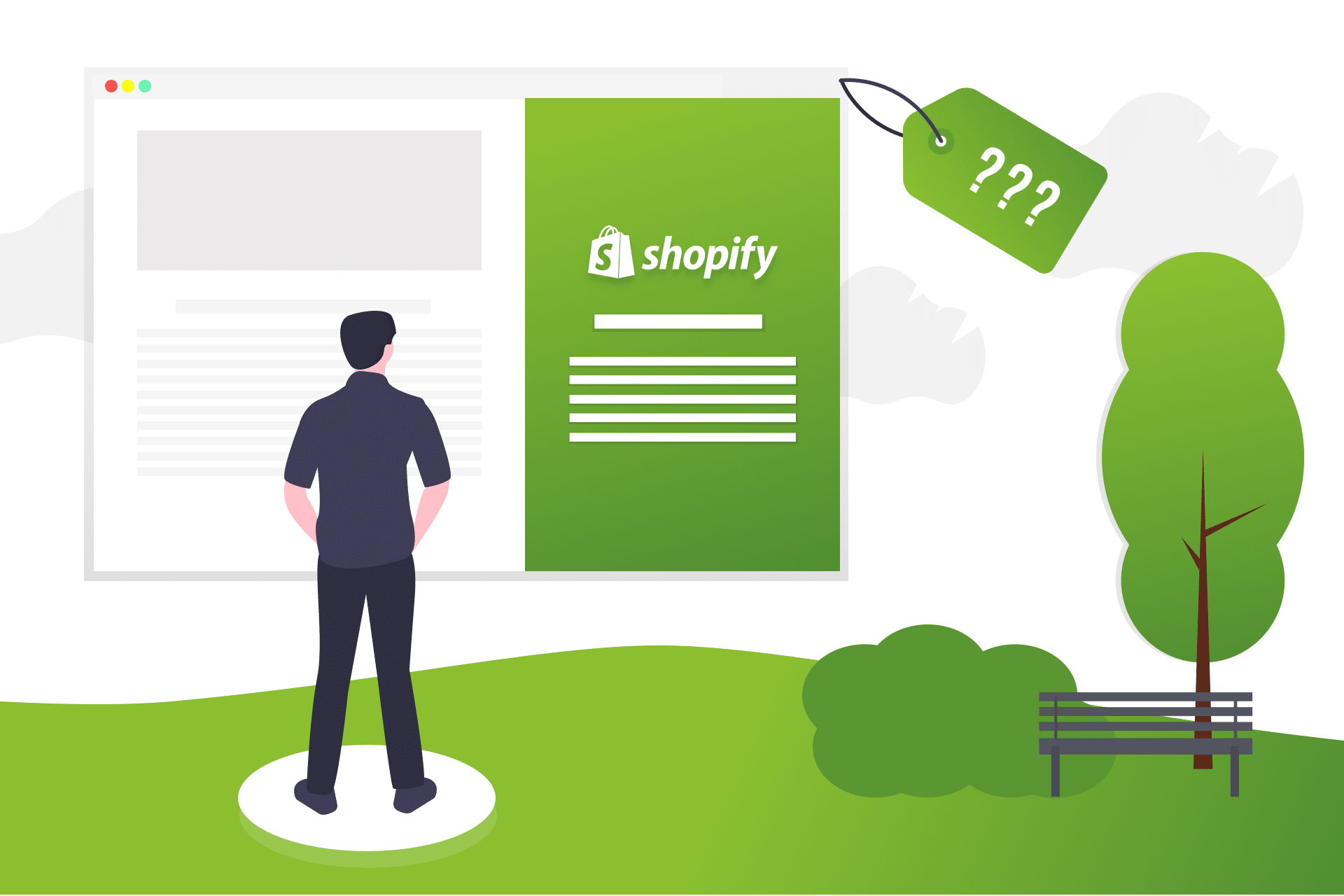Cost of Shopify: What's the Cost of Running a Shopify Store?
Explore the world of Shopify fees and pricing with this in-depth guide. Learn about the different subscription tiers, associated costs, and considerations for businesses of varying sizes.

In the bustling world of online commerce, Shopify stands as a beacon of opportunity for entrepreneurs eager to establish their digital storefronts. Its user-friendly platform and array of features make it an attractive choice for businesses of all shapes and sizes.
However, beneath the surface lies a crucial consideration: Shopify fees. Understanding the intricacies of these costs is essential for making informed decisions and maximizing profitability. Join us as we embark on a deep dive into the world of Shopify costs, pricing, exploring the different plans, associated costs, and considerations for businesses of varying scales and online store.
Shopify Payments Plans and Costs:
Shopify offers three main subscription tiers, each tailored to meet the diverse needs of online merchants. Let's explore the features and costs associated with each plan:
- Shopify Basic Plan: Priced at $29 per month, the Basic Shopify plan is ideal for entrepreneurs just starting their online journey. It offers essential features such as a customizable website, unlimited products, and 24/7 support. However, it's important to note the transaction fees ranging from 2.9% + 30¢ to 2.4% + 30¢, depending on the chosen payment gateway.
- Shopify Plan: At $79 per month, the Shopify plans is geared towards growing businesses looking to scale their operations. In addition to the features offered in the Basic plan, it includes perks like gift card functionality, professional reporting, and abandoned cart recovery. While the monthly subscription fee is higher, transaction fees are slightly lower, ranging from 2.6% + 30¢ to 2.1% + 30¢.
- Advanced Shopify Plan: Priced at $299 per month, the Advanced Shopify plan is designed for high-volume businesses with complex needs. It offers advanced features such as advanced report building, third-party calculated shipping rates, and up to 15 staff accounts. Transaction fees further decrease, ranging from 2.4% + 30¢ to 1.6% + 30¢, making it an attractive option for established enterprises.
Choosing the Right Plan for Your Business:
Selecting the appropriate Shopify plan requires careful consideration of your business's size, growth trajectory, and specific requirements. Here's a breakdown of which plan may be suitable for different types of businesses:
- Small Businesses and Startups: For newly launched ventures with limited budgets and a modest product catalog, the Basic Shopify plan provides a cost-effective solution to get started. As the business grows, upgrading to the Shopify plan may be necessary to access additional features and support.
- Growing Businesses: As businesses experience growth and an increase in sales volume, transitioning to the Shopify plan offers access to advanced features like gift cards and professional reporting. This plan provides the scalability needed to accommodate expansion without compromising on functionality.
- High-Volume Enterprises: Established enterprises with substantial sales volume and complex requirements will benefit most from the Advanced Shopify plan. With advanced reporting capabilities, custom shipping options, and lower transaction fees, this plan is tailored to meet the demands of large-scale operations.
Additional Costs:
While subscription fees form the core of Shopify's pricing structure, businesses must also budget for supplementary expenses:
- App Fees: Integrating third-party apps to enhance store functionality may incur additional charges. Whether it's for inventory management, email marketing, or customer support, app fees can vary depending on the complexity and customization required.
- Theme Costs: A visually appealing storefront is essential for attracting and retaining customers. While Shopify offers a selection of free themes, premium themes with advanced customization options are available for purchase. Theme costs can range from a one-time fee to a recurring subscription, depending on the chosen theme and developer.
- Domain Fees: Establishing a unique online identity through a custom domain is essential for building brand recognition and trust. While Shopify provides a free myshopify.com domain, many merchants opt to purchase a custom domain for a more professional appearance. Domain registration fees vary depending on the chosen domain registrar and the length of the registration period.
- Marketing Expenses: Driving traffic to a Shopify store requires strategic marketing efforts. Whether through paid advertising, influencer partnerships, or content marketing, promoting the store involves financial investment. Budgeting for marketing expenses is essential for maximizing visibility and generating sales.
Calculating Total Cost:
To illustrate the impact of Shopify fees on overall expenses, let's consider an example:
- Assume a Shopify store owner opts for the Basic plan, generating $10,000 in monthly revenue.
- With transaction fees averaging at 2.7%, the total transaction fee amounts to $270.
- Adding the monthly subscription fee of $29, the total operating cost for the month equals $299.
Tips to Minimize Costs:
While Shopify fees are inevitable, there are several strategies merchants can employ to mitigate expenses:
- Optimize Payment Gateways: Choose payment gateways with lower transaction fees to minimize costs. Consider negotiating rates or exploring alternative payment processors to reduce expenses.
- Explore Cost-Effective Apps: Research and compare app functionalities and pricing to find affordable solutions that meet your business needs. Look for apps with free trials or tiered pricing models to test functionality before committing to a subscription.
- Evaluate Marketing ROI: Regularly analyze the performance of marketing campaigns to identify areas for optimization and ensure a positive return on investment. Focus on channels that drive the highest conversion rates and adjust budget allocations accordingly.
Commonly Asked Questions:
Here are some commonly asked questions related to Shopify plans, costs, and credit card fees:
1. What credit cards does Shopify accept?
Shopify accepts a wide range of credit card for online transactions, including Visa, Mastercard, American Express, Discover, and more. You can securely process payments from customers using these major credit card providers.
2. Are there any fees for using credit cards on Shopify?
Yes, while Shopify itself doesn't charge any additional fees for using credit cards, you may incur standard credit card processing fees. These fees typically range from 2.9% + 30¢ to 2.4% + 30¢ per transaction, depending on your Shopify plan.
3. What are the different Shopify plans available?
Shopify offers various plans to cater to different business needs, including Basic Shopify, Shopify, and Advanced Shopify. Each plan comes with its own set of features and pricing, allowing you to choose the one that best suits your requirements and budget.
4. How much do Shopify plans cost?
The cost of Shopify plans varies depending on the features and services included. The Basic Shopify plan starts at $29 per month, the Shopify plan starts at $79 per month, and the Advanced Shopify plan starts at $299 per month. Additional fees may apply for add-on services and transaction processing.
5. What are Shopify's transaction fees?
Shopify charges transaction fees for each online sale processed through its platform. These fees range from 2.9% + 30¢ to 2.4% + 30¢ per transaction, depending on your Shopify plan. However, you can reduce transaction fees by using Shopify Payments as your payment gateway.
6. Is Shopify POS included in Shopify plans?
Yes, Shopify POS (Point of Sale) is available as an add-on service for Shopify plans. With Shopify POS, you can seamlessly integrate your online and offline sales channels, manage inventory, accept payments, and track customer data across all touchpoints.
7. What is the Shopify Starter Plan?
The Shopify Starter Plan is a basic subscription plan offered by Shopify. However, as of the last update, Shopify does not offer a specific plan named the Starter Plan. Instead, they offer the Basic Shopify plan as the entry-level option for new merchants.
Utilizing SEO Tools:
In addition to managing costs and optimizing store performance, leveraging search engine optimization (SEO) tools is crucial for driving organic traffic to your customizable online store. One such tool is SEOPro, a Shopify app designed to empower merchants to increase traffic from Google and enhance the online visibility of ecommerce platform.
SEOPro is a Shopify App that enables merchants to fix SEO issues and optimize their SEO content, ultimately driving more traffic to their Shopify stores. By addressing SEO challenges and implementing effective strategies, merchants can improve their search engine rankings and attract more potential customers.
Incorporating SEO tools like SEOPro into your Shopify store management strategy can significantly impact your store's visibility and traffic. By addressing SEO issues, optimizing content, and leveraging tools for bulk optimization, merchants can improve their search engine rankings and attract more potential customers. With SEOPro's comprehensive suite of features, merchants can take control of their store's SEO performance and unlock new opportunities for growth and success.





